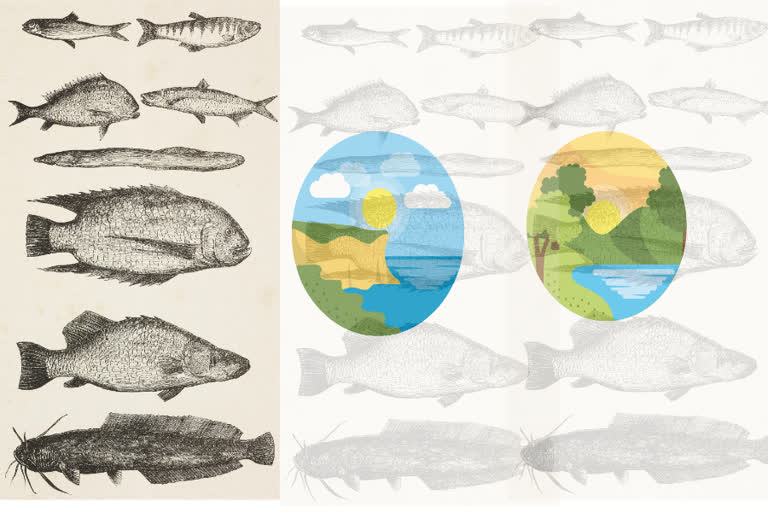LEXINGTON, Ky: The fish of Lake Tanganyika serve as an essential source of protein for people in four rapidly growing countries, said Michael McGlue, a professor of stratigraphy in the UK Department of Earth and Environmental Sciences, who has been studying the great lake _ the world's second-oldest and second-deepest _ for several years.
"The populations of the countries surrounding the lake _ Tanzania, Burundi, Zambia, and the Democratic Republic of the Congo _ are among the world's fastest-growing, but due to a convergence of climate change, overfishing, and sediment pollution the number of fish caught from the lake has been in major decline for years", McGlue said.
"There are ever more people, and increasingly less food, it's scary," McGlue said.
But McGlue and his research team's latest study, published in the journal Science Advances last week, literally digs into the lake's prior environmental history to hopefully arm the governments working to sustain the lake's fish population with predictive information for how the lake's food web responds to rapidly changing climates.
In 2017, McGlue and a team of other UK researchers traveled to Tanzania in search of mud from the lake bottom. Sediment which piles at the bottom of a lake over time can be very informative to scientific research, as a sample of muck collected straight down can show how a lake has changed over time.
Also Read: Asbestos could be a powerful weapon against climate change
Algae fossils show signs of life, and organic carbon found in the samples can be dated back to specific time periods. Researchers can match those time periods to weather and environmental trends at those times.
The small dagaa fish are abundant in the lake and are a local dietary staple. Dagaa feed on algae and plankton, so a decrease in algae or plankton generally means there's fewer fish in the lake.
McGlue, who has been working around the lake since 2005, said he and his team chartered a freighter in Tanzania. They welded on their scientific equipment: a winch, a generator, and a coring device _ "a fancy plastic tube." They steamed down to the southern part of the lake, a two-day journey.
"The most difficult part of the collection is fighting the elements," McGlue said. "The winds and waves are very, very high on the lake, particularly in the dry season, which is when I go there to work."
McGlue and his team spent much of their time on the cruise sheltering in bays near the shoreline from the harsh waves. But when the winds died, "we raced out to our stations and collected the cores," he said according to a UK press release on the study.
Their samples collected, McGlue returned to the United States where researchers from a variety of institutions analyzed the layers of sediment. The sediment collected allowed researchers to see how the lake changed over small periods of time, like months and years.
"This is quite rare _ and crucial _ for using the data to guide fisheries management and conservation practices," McGlue said according to the release. "Designing effective strategies for fisheries management using low-resolution data is a challenge because environmental changes that affect the food web can occur rapidly."
The team found that algae production increased when there was higher solar irradiance _ a higher amount of the sun's energy reaching the sun's atmosphere _ and in the presence of a La Nina, essentially the periodic presence of warmer ocean water in the western Pacific Ocean near Asia which has impacts on weather globally.
In the face of lower solar irradiance and the presence of an El Nino, where warmer ocean water moves to the eastern Pacific, closer to South America, then algae production in the lake drops, McGlue said.
Providing that sort of information to the people who live around the lake will enable to potentially plan for a coming drop in fish production in the face of an El Nino for example.
Ismael Kimirei, a co-author of the study and the director-general of the Tanzania Fisheries Research Institute, says it is critical to make policy decisions in the region that are informed by research.
"The importance of fisheries to the food security of the east and central African nations cannot be overemphasized," Kimirei said, according to the UK release.
"There is a growing body of research on declining fish production from Lake Tanganyika and other great lakes _ which coupled with the findings of this study, and the ever-increasing fishing pressure _ paint a gloomy future for the region. Therefore, sustainable fisheries of the lake can be achieved/maintained only if conventional fisheries management marries with ecosystem management and conservation approaches."
(c)2020 Lexington Herald-Leader (Lexington, Ky.)
Distributed by Tribune Content Agency, LLC.
Also Read: Zoo scientists revive cells from 40-year deep freeze to clone endangered horse
